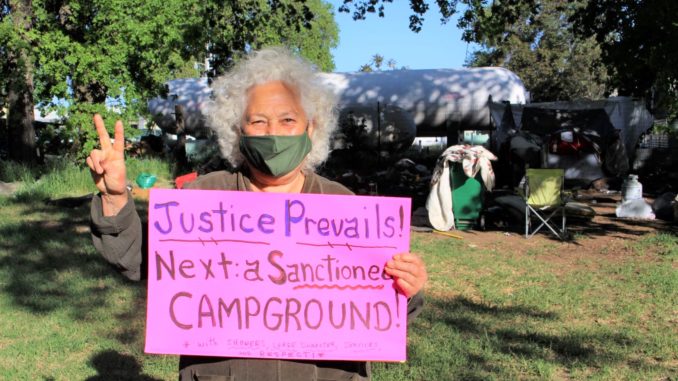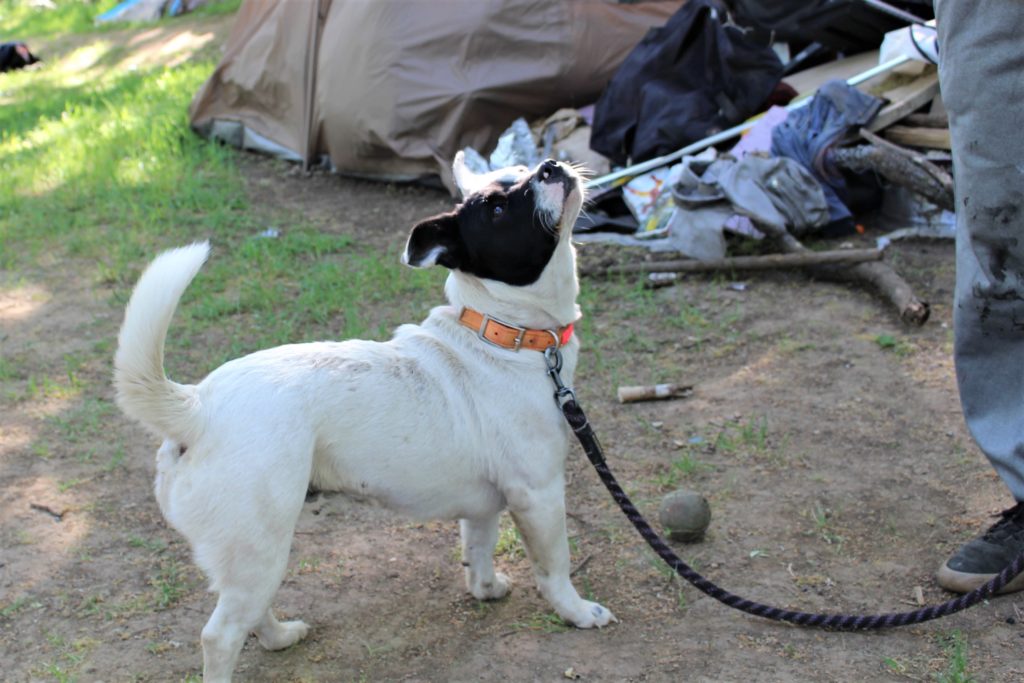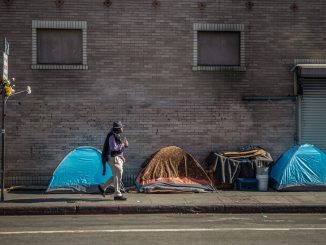
On Monday (April 12) at 9 a.m., a man named Lance sat in a camping chair a few hundred feet from Comanche Creek, sharing a piece of chicken with his dog, Chloe. An air of calm reigned on the greenway, in stark contrast to what he and other residents of the city’s largest homeless encampment expected that morning—to be “swept” from the area by Chico police and public works personnel.
Lance (who wouldn’t provide his last name for fear of harassment he said he’s experienced from citizens angry about the encampments) had spent the weekend preparing for the worst. The entirety of his worldly belongings sat a few feet away—packed, stacked and ready to move—as he’d intended to be gone before the city’s anticipated 8 a.m. arrival. Instead, he said he felt “relief and gratitude” that there would be no rumbling of heavy equipment, no police demanding compliance and no desperate scrambling as neighboring campers struggled to gather their belongings that morning.
On April 8, Lance and others living at Comanche Creek received 72-hour notices to vacate the area, but the sweep—as well as any actions to aimed at enforcing camping laws or issuing new eviction notices on public property—got preempted by a temporary restraining order granted Sunday evening by U.S. District Judge Morrison C. England Jr.
The request is part of a larger legal challenge launched by Legal Services of Northern California, a nonprofit civil legal aid provider. On April 8, LSNC filed a lawsuit against the city of Chico and its police department on behalf of eight unhoused individuals, seeking an injunction to bar the city from continuing encampment sweeps that began in January.
Limited reprieve
Cory Turner, an LSNC attorney spearheading the legal effort, told the CN&R that the restraining order was an eleventh-hour effort. Turner was at Comanche Creek Monday morning informing campers about the legal efforts and said he filed the request during the “wee hours” of Sunday morning.
The order will remain in effect until a preliminary injunction hearing scheduled for April 22, though Turner said at any time the city can give two days’ notice to file to ask the court to rescind the order. The city had made no movement to do so as of publication and issued a brief statement to the media April 12.
Acknowledging the lawsuit and temporary restraining order, the statement said it’s the city’s practice not to comment on active litigation; “however, this item has drawn much interest and the City wanted to publicly note the abidance of the court’s order.”
Turner said the order protects campers from eviction, public camping and storage laws, but does not protect against myriad other park rules that were elevated to criminal offenses by an urgency ordinance passed by the newly seated conservative majority council at its first meeting on Dec. 8.

“There are other rules in the park about [dogs], glass containers, littering and more numerous things than I can cite, so technically the restraining order wouldn’t apply to those,” he said.
Homeless advocates and protesters circulated calls to action on social media anticipating Monday’s sweeps. More than a dozen were on-hand that morning. With no police officers to face off against and no urgent need to help campers pack and move, they instead turned their efforts toward helping clean the area, hand out food and water, and casually chat with campers.
“Some of us thought there was a slim chance the city might ignore the order,” said advocate Chris Nelson, who was cited for refusing to follow police orders to move at a “die-in” protest outside of City Council chambers March 2. “Some of us wanted to be here in case the city did something rash. And knowing that the city can still cite people for things like littering, we’re here to help prevent that.”
Nelson lauded the legal efforts.
“I think the lawsuit does a very good job of pointing the finger at the city of Chico and City Council,” she said. “It points at their failings to face the crisis, their hubris and their contempt for human dignity. They’ve had many opportunities to establish safe and sanctioned camping and other shelter; they’ve simply decided not to.”
Laying it all out
In the span of 31 data- and detail-packed pages, the lawsuit chronicles efforts to criminalize the homeless via ordinances and actions, from the passage of laws such as sit/lie to this year’s encampment sweeps.
The lawsuit notes that the city declared a shelter crisis in October 2018, acknowledging an “unprecedented shortage of emergency shelter and affordable housing,” and how the Camp and North Complex fires had since exacerbated the situation. It states that the city’s efforts to criminalize homelessness amount to violations of the U.S. Constitution.
“The city’s actions against involuntarily homeless individuals violate their right to be free from cruel and unusual punishment and excessive fees, and to due process of the law under the Eighth and Fourteenth Amendments of the United States Constitution,” it reads. “The city’s persistent and aggressive enforcement initiative is taking place as the global Covid-19 pandemic continues to pose immediate danger to the health and safety all people who are unsheltered, and to the entire community, in violation of the Fourteenth Amendment.”
The suit is filed on behalf of eight separate plaintiffs, all members of Chico’s unhoused population, stating they “are at immediate risk of being cited, arrested and prosecuted for sleeping, sitting, lying, resting and simply existing in the City of Chico.”
All of the plaintiffs are indigent with little to no income and they include Camp Fire survivors, elderly individuals and those suffering from severe mental and physical illness and injuries. Most have had several contacts with law enforcement—including incidents resulting in citations and seizures of their property—for camping and other violations directly related to their unhoused status.
The lawsuit’s filing came just days after the Chico City Council’s most blatant attempt yet to flip narratives about Chico’s homeless population.
At the April 6 City Council meeting, Councilwoman Alex Brown pitched a new plan to allow legal camping on city property occupied by Silver Dollar BMX. Brown’s motion to explore that option was replaced with a substitute motion by Councilwoman Kami Denlay.
Claiming that Chico doesn’t have a shelter crisis because unhoused individuals will not make use of shelter—and backing that claim with findings from an unfinished survey that critics say is designed to confirm the conservative council’s biases regarding the homeless population—Denlay called for the city to stop working on an outdoor shelter concept at the BMX site; revisit the use of Community Development Block Grant funds already approved for shelter issues for possible alternative uses; and to rescind the Shelter Crisis Declaration.
After getting a nod from City Attorney Vince Ewing that the substitute motion could accomplish those goals, the council voted 5-2 along party lines in favor of Denlay’s motion. However, an April 8 press release from the city announced that the vote did not rescind the declaration, as the adoption of a resolution would be needed to rescind the prior action.
According to City Manager Mark Orme, City Council has no plans to further pursue rescinding the shelter crisis, which expires June 30.
“At this time, we do not anticipate any resolution returning,” Orme said today (April 16).




Be the first to comment